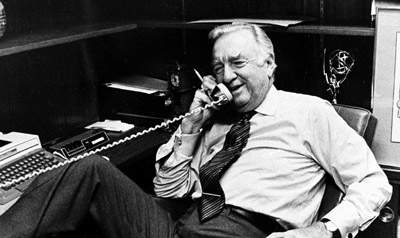In a 2006 interview, Walter Cronkite recalled how the search for missing reporters in Vietnam led him to CPJ and on to Turkey. Interview by Maya Taal
When CPJ first contacted you in 1981, it was a start-up organization with just a few people. So why would you agree to be honorary chairman?
I’d recently been active in an attempt to trace the fate of several correspondents and photographers who disappeared on assignment in Southeast Asia at the time of the Vietnam War. I thought my experience there might be helpful in organizing the Committee to Protect Journalists. To most of us who had had any experience in wartime it seemed clear that a strong organization to protect journalists was necessary. Our American reputation for the defense of press freedom makes us particularly good ambassadors in extending those freedoms to nations where they have been denied.
Tell us about your experience leading a committee of journalists seeking information about the missing in Vietnam.
While my name became attached to the efforts to find missing photographers and reporters in the Vietnam War, most notably in Cambodia, there were other journalists far more diligently and daringly involved in the search for information regarding our missing comrades. Some of the most dedicated I think never, to this day, have given up on finding many of the missing. It was their dauntless efforts to find their comrades that inspired me to be as helpful as I could.
In 1995, you helped persuade Turkish Prime Minister Tansu Ciller to drop charges against Reuters correspondent Aliza Marcus, who faced prison for reporting on counterinsurgency strikes against Kurdish rebels. Tell us about it.
The committee’s long-running efforts to persuade several consecutive governments in Turkey to adopt basic democratic principles of free speech and free press resulted in wide recognition of our devotion to these freedoms. It’s an enduring effort and I’m proud to say that (former chairwoman and board member) Kati Marton and I were early representatives of the committee, dispatched to try to relieve the Turkish leadership’s incredibly repressive treatment of the press.
Over 25 years, what milestone in the press freedom movement comes to mind?
Advances certainly include the United Nations’ establishment of a World Press Freedom Day, celebrated annually on May 3 since 1994. It reminds the entire world of the necessity for a free press–and the dangers to those who fight for one.
Editor’s note: This interview first appeared in the October 2006 edition of CPJ’s magazine, Dangerous Assignments.
